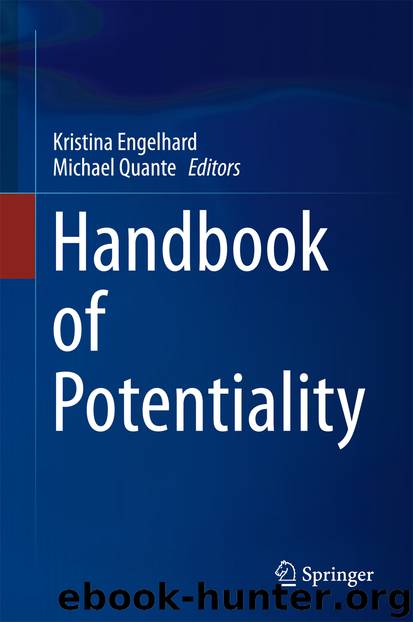Handbook of Potentiality by Kristina Engelhard & Michael Quante

Author:Kristina Engelhard & Michael Quante
Language: eng
Format: epub
Publisher: Springer Netherlands, Dordrecht
Some scholars have been encouraged by this passage to interpret Berkeley as a phenomenalist. The existence of objects we can perceive by the senses would thus come down to the existence of sets of possible sensations. Perceivable objects could be regarded as mere potentials. But it is misleading if not plainly wrong to call Berkeley a phenomenalist, for there is no evidence that Berkeley did not endorse the fundamental anti-scholastic principle that the potential exists only in virtue of the actual. Berkeley neither holds that all statements about sensible objects are equivalent in meaning to statements describing sensations (whose existence and nature depend on the sensing subject) nor does he believe that sensible objects are permanent possibilities of sensations. According to Berkeley, our talk of sensible objects rests on the laws of nature—on lawful regularities revealed by our ideas of sense and sustained by God . In the light of this theory a translation of statements about sensible objects into statements about the sensations and ideas of human beings is not possible without reference to these regularities, which have a source independent of human beings and their sensations and ideas. Furthermore, if Berkeley were a phenomenalist he would not need to invoke God to guarantee the continuous existence of sensible things. If for him a chair were nothing but a set of systematically correlated possible sensations, it could exist without its being perceived. Berkeley does not advocate a phenomenalistic account of perceivable objects. For he not only holds that sensible objects are collections of ideas but also claims that ideas exist if and only if they are perceived. For an idea and for any collection of ideas to exist means to be perceived not just to be perceivable.
While Berkeley is well-known for his idealism and immaterialism, he is less so for his realism. Although he abandons the concept of formal existence—which was traditionally supposed to stand in contrast to objective existence—and thereby makes the objective existence of things (their existence in the mind as things perceived or thought of) their only way of being, Berkeley wants to hold on to the real existence of sensible things. He insists on the existence of a world which we can perceive through our senses and which we can come to know through experience—a world that exists independently of any finite spirit. To account for the difference between imagination and reality Berkeley distinguishes between two kinds of ideas: ideas of sense, on the one hand, and ideas of imagination on the other. Our ideas of sense (e.g. tables and smells) are caused by God in a systematic way (obeying, as it were, the laws of nature). Ideas of imagination are produced by us. They are less lively, orderly and stable than our ideas of sense. Berkeley is convinced that the distinction between these two kinds of ideas enables him to set apart reality and imagination (fancies, dreams, hallucinations, etc.). And he insists that he does not want to question the reality of the perceptible world.
Download
This site does not store any files on its server. We only index and link to content provided by other sites. Please contact the content providers to delete copyright contents if any and email us, we'll remove relevant links or contents immediately.
Enlightenment Now: The Case for Reason, Science, Humanism, and Progress by Steven Pinker(7306)
A Journey Through Charms and Defence Against the Dark Arts (Harry Potter: A Journey Through…) by Pottermore Publishing(4798)
The Immortal Life of Henrietta Lacks by Rebecca Skloot(4574)
A Journey Through Divination and Astronomy by Publishing Pottermore(4379)
Elon Musk by Ashlee Vance(4121)
Origin Story: A Big History of Everything by David Christian(3687)
COSMOS by Carl Sagan(3617)
Alchemy and Alchemists by C. J. S. Thompson(3514)
Bad Pharma by Ben Goldacre(3422)
Enlightenment Now by Steven Pinker(3367)
Shadow of Night by Deborah Harkness(3357)
Inferior by Angela Saini(3311)
A Mind For Numbers: How to Excel at Math and Science (Even If You Flunked Algebra) by Barbara Oakley(3299)
Origin Story by David Christian(3194)
The Code Book by Simon Singh(3177)
Signature in the Cell: DNA and the Evidence for Intelligent Design by Stephen C. Meyer(3126)
The Elements by Theodore Gray(3050)
A Brief History of Time by Stephen Hawking(3022)
A Journey Through Potions and Herbology (A Journey Through…) by Pottermore Publishing(2848)
